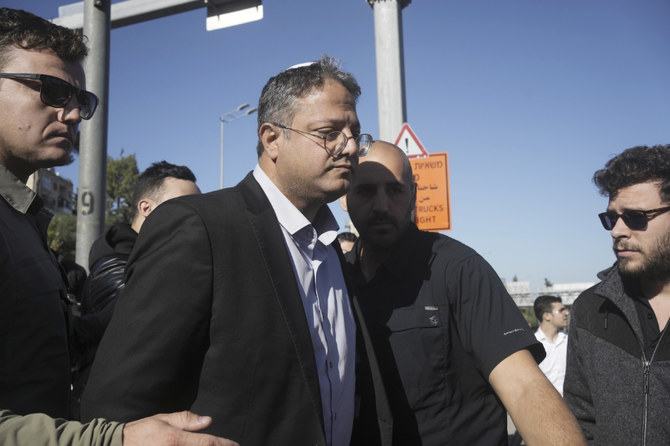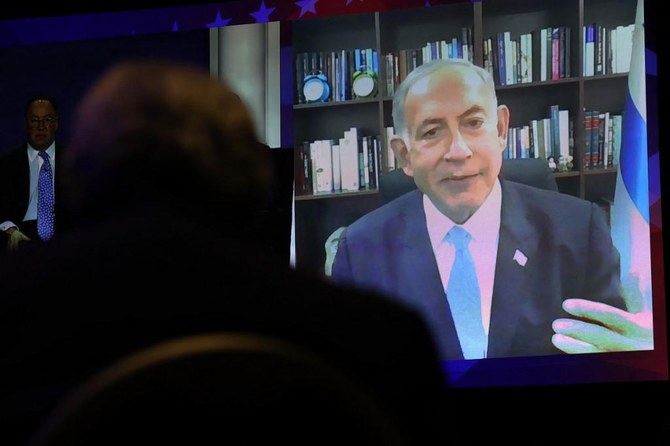RAMALLAH: Palestinians are deeply concerned that Israeli far-right politician Itamar Ben-Gvir is to become police minister in a coalition deal with Prime Minister-designate Benjamin Netanyahu’s Likud Party that is set to create the most right-wing government in the country’s history.
Given Ben-Gvir’s ultra-extremist views, more violence and instability are expected in the Palestinian Territories and East Jerusalem.
He was convicted in 2007 of racist incitement against Arabs and backing a group considered by Israel and the US to be a terrorist organization.
Ben-Gvir will have an expanded security portfolio that will include responsibility for Border Police in the occupied West Bank.
Ibrahim Melhem, spokesman for the Palestinian government, told Arab News that the Israelis “should worry more than the Palestinians about the appointment of Ben-Gvir,” who espouses an extremist, racist, settler ideology.
He said: “He will not achieve security or stability for them as he promised, and will not defeat the Palestinian people. His appointment means greater sacrifices for the Palestinians and, in return, less security for the Israelis.”
Mustafa Barghouti, secretary-general of the Palestinian National Initiative Movement, told Arab News: “This is a hazardous development, and it means that the entire new Israeli government is moving toward a fascist policy, as Ben-Gvir will be responsible for Al-Aqsa Mosque, the Israeli police, and the Palestinians inside Israel."
He added that the world must see the “result of its silence on Israel’s successive crimes in recent decades. It is required to impose sanctions and a boycott on the Israeli government and declare the Ben-Gvir party a terrorist party.”
Ben-Gvir has long been a fierce opponent of Palestinian statehood, having been a settler in the West Bank, which Israel occupied in the 1967 war.
He was seen brandishing a gun at Palestinian demonstrators in occupied East Jerusalem during the election campaign.
Ben-Gvir also supports Jewish prayer at Al-Aqsa Mosque complex, a flashpoint site holy to both Muslims and Jews. The location has seen repeated clashes between Muslims and Jewish visitors defying rules prohibiting prayer by non-Muslims.
He has also vowed to introduce unprecedented punitive restrictions on Palestinian prisoners.
The Palestinian Foreign Ministry said the deal involving Ben-Gvir would have a “potentially catastrophic impact on the Israeli-Palestinian conflict” and hinder the revival of negotiations between the two sides, which stalled in 2014.
The ministry has again demanded that the international community react to developments and put pressure on the incoming government to ensure that racist policies against Palestinians are not implemented.
Basem Naim, head of the Hamas political department in Gaza, told Arab News: “Appointing Ben-Gvir to this position is like appointing a fugitive criminal as a police governor.
“From our point of view, as Palestinians, the matter will not differ much because the essence of the work of the Zionist security services is racist and is based on oppressing the Palestinians and working to abuse them by all means.”
Retired Col. David Hacham, a former Arab affairs adviser to the Israeli Ministry of Defense, told Arab News that the appointment was an expected step by Netanyahu.
But he added: “We must consider that there may be an expected difference between Ben-Gvir’s prior positions and statements, and his actual behavior after his appointment.”
His arrival in government has prompted the US State Department to say that it expects all officials in the new Israeli administration to share the values of an “open, democratic society, including tolerance and respect for all in civil society.”
Meanwhile, a recent survey conducted by the Israel Democracy Institute shows that 71 percent of Israelis support the execution of Palestinian prisoners who carried out operations that resulted in deaths and injuries, compared to 63 percent in 2018.
Some 55 percent of Israelis are reported to support the execution of operatives in the field, compared to 37 percent in the previous survey.
The findings also reveal that 45.5 percent support heavy shooting toward the Palestinian population in response to any provocation, compared to 27.5 percent four years ago.
Support for the Israeli army ensuring that it does not violate the international laws of war has decreased.
Qadri Abu Bakr, head of the Prisoners and Ex-Prisoners Affairs Commission, told Arab News that Palestinian prisoners “are ready to deal with new repressive measures, and if any of their rights are violated, they will have a response.”
Separately, the extremist Israeli group “Price Tag” burned four Palestinian vehicles at dawn on Friday and wrote racist phrases on walls in the towns of Abu Ghosh and Ein Naquba to the west of Jerusalem.





























